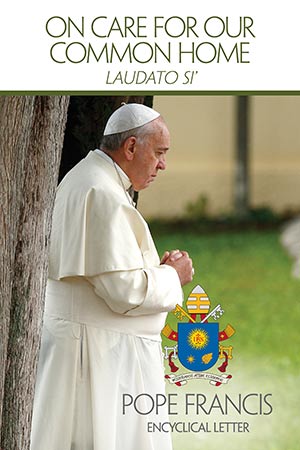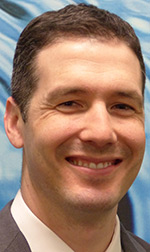The City of Milwaukee Office of Environmental Sustainability, directed by Erick Shambarger, might be described as Milwaukee’s response to “Laudato Si’” – had the OES been formed after Pope Francis’ encyclical.
The acknowledged “mission” of the OES, formed in 2006, is to “create an alignment of economic and environmental interests that improve Milwaukee’s quality of life for current and future generations.… ”
 This is the cover of the English edition of Pope Francis’ encyclical on the environment, “Laudato Si’, on Care for Our Common Home.” The long-anticipated encyclical was released at the Vatican June 18. (CNS photo/courtesy U.S. Conference of Catholic Bishops)That mission statement reverberates in the recently issued papal letter whose full title is “Laudato Si’ (Praised Be), on Care for Our Common Home.”
This is the cover of the English edition of Pope Francis’ encyclical on the environment, “Laudato Si’, on Care for Our Common Home.” The long-anticipated encyclical was released at the Vatican June 18. (CNS photo/courtesy U.S. Conference of Catholic Bishops)That mission statement reverberates in the recently issued papal letter whose full title is “Laudato Si’ (Praised Be), on Care for Our Common Home.”
In the encyclical, Pope Francis states, “Each community can take from the bounty of the earth whatever it needs for subsistence, but it also has the duty to protect the earth and to ensure its fruitfulness for coming generations.”
Milwaukee’s OES boasts programs dedicated to improving energy effectiveness locally. Its website contends that the office, an appendage of city government, “has helped thousands of homeowners and hundreds of businesses and organizations achieve their sustainability goals while reducing emissions, waste and resource inefficiencies.”
After five years as OES deputy director and eight previous years as a city economist and budget analyst, Shambarger, 37, was promoted to OES director in June, the same month “Laudato Si’” was promulgated.
A member of St. Alphonsus Parish, Greendale, whose two children attend the parish elementary school and whose wife, Amy, serves as dean of student services at Milwaukee’s St. Sebastian School, Shambarger spoke highly of Pope Francis’ letter on climate, sustainability and the environment.
“In general,” Shambarger commented in a late-August telephone interview with the Catholic Herald, the encyclical was “accessible, clear and profound.” He added, “It’s a good book. People should put it on their reading list” – and should read it in its entirety.
What has been called the first papal encyclical dealing primarily with the environment “is not just about the environment,” said Shambarger, but “about our spiritual connection to the environment.” Discussion groups devoted to “Laudato Si’” in parishes would be a nice thing, he said.
The Nebraska-reared OES director, a Milwaukee resident who came to the city to attend Marquette University as an  Erick Shambargerundergraduate some 20 years ago – and subsequently earned a master’s degree in public affairs from the University of Wisconsin – cited an encyclical passage he found particularly striking: “We fail to see that some are mired in desperate and degrading poverty, with no way out, while others have not the faintest idea of what to do with their possessions.”
Erick Shambargerundergraduate some 20 years ago – and subsequently earned a master’s degree in public affairs from the University of Wisconsin – cited an encyclical passage he found particularly striking: “We fail to see that some are mired in desperate and degrading poverty, with no way out, while others have not the faintest idea of what to do with their possessions.”
Speaking of himself and Amy – also a Marquette graduate – Shambarger said, “The Jesuit brand of Catholicism was pretty influential on us: finding God in all things; the sense of public service”; and service to “the more marginalized” individuals in one’s midst.
“My faith is important to what I do. Personally, I am motivated by my faith to do what I do. I also think (environmental sustainability) is in our self-interest as a human people,” he added.
In his letter, the pope spoke favorably of energy conservation, sustainable agriculture and lessening waste.
According to Shambarger, Milwaukee is on the same page as Pope Francis.
“We are doing what we can, (and) have programs specifically set up around these things,”— such as the so-called “Green Corridor” on South 6th Street for farmers markets, he said, noting many large cities have an equivalent to Milwaukee’s OES.
What might people to whom Francis addressed “Laudato Si’” – atypically, for such a letter, all of the planet’s inhabitants rather than solely members of the Catholic community – opt to do in the aftermath of its publication?
“I believe in the notion of being a ‘contemplative in action,’” Shambarger said. “I’d suggest that your readers prayerfully read the (encyclical) for themselves and then act.
Our website provides some practical programs that people can use, but there are also dozens of other organizations that (deal) with sustainability missions in which people can participate.”
